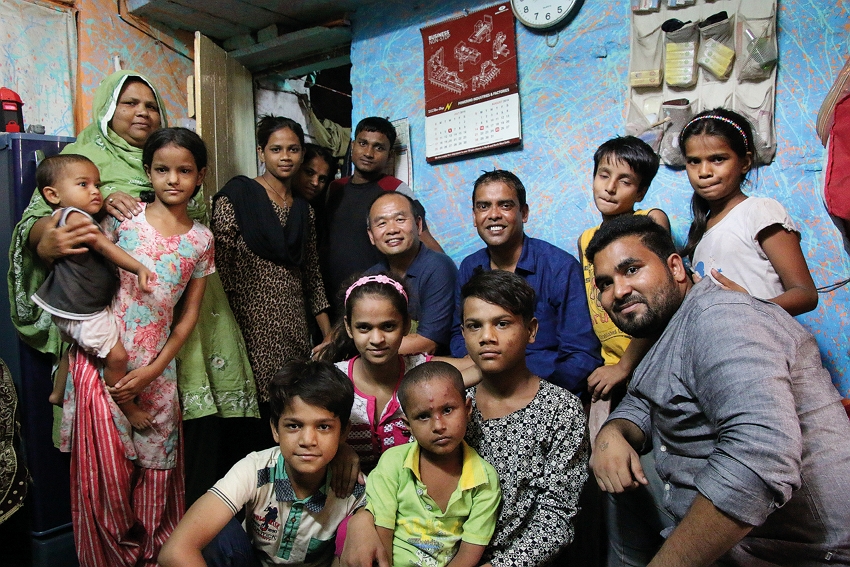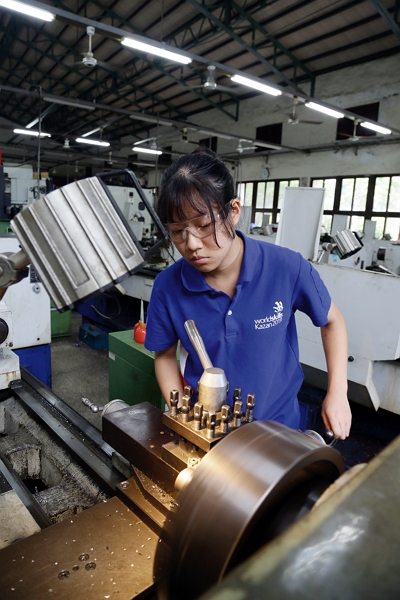New Southbound Policy Portal

“Children’s dreams are only as big as their teachers’ worlds,” says Hsieh Chih-mou. A professor with the Department of Civic Education and Leadership at National Taiwan Normal University, Hsieh takes his students on outings that develop leadership skills and provide wilderness therapy. (courtesy of Hsieh Chi-mou)
“Children’s dreams are only as big as their teachers’ worlds,” says Hsieh Chih-mou. A professor with the Department of Civic Education and Leadership at National Taiwan Normal University, Hsieh takes his students on outings that develop leadership skills and provide wilderness therapy. Some of his former students have gone on to establish schools in Nepal and northern Thailand, taking up the torch of making the world a better place.
Yang Hung-yi, a teacher in the machinery section of Muzha Vocational High School, uses his own life story as a teaching tool to encourage his students to look beyond the technical‡vocational framework, explaining to them how diligent study enabled him to win a gold medal in a vocational skills competition in Taiwan and to take part in international competitions.
In June of this year, Professor Hsieh Chih-mou of National Taiwan Normal University (NTNU) took 11 students sailing in Hong Kong. In July, he took students hiking in the Grand Canyon in Arizona, and he will soon take another group horseback riding in Mongolia. Hsieh, who teaches outdoor leadership and wilderness therapy, advocates getting students out of the classroom and into the outdoors to cultivate their leadership and decision-making skills and encourage them to reflect on the world.

NTNU professor Hsieh Chi-mou’s leadership training emphasizes practical experience, self-reflection, self-development, serving others, and valuing study.
Hsieh started his teaching career at National Taiwan University of Sport in 1998, and began offering an “overseas mountain-climbing leadership class” in 2005. In every year since, he’s taken a group of students with no outdoor experience and trained them in mountaineering, writing project proposals for fundraising, and risk management. His classes have summited Himalayan peaks, learned to kayak in Alaska, and even climbed Mt. Kilimanjaro, Africa’s tallest mountain.
The thinking underlying his approach to education is this: “If you can teach a group with no experience to climb a Himalayan mountain, what can stop them from ascending life’s summits?” Some of Hsieh’s students have taken cancer patients rock climbing. Five took 12 drug addicts on a 21-day wilderness therapy expedition, and six of those addicts remained drug-free six months later. Still other students built a school in Nepal and lavatories in Tanzania.
“My students aren’t famous, but they’re making the world a better place,” says Hsieh.

Hsieh Chi-mou, who also heads up the Chinese Rock Leadership Association, has long been active in helping Indians living in slums and impoverished children in Nepal and Thailand’s Golden Triangle. Here, Hsieh poses with residents of a poor Indian neighborhood. (courtesy of Hsieh Chi-mou)
The Ministry of Education designated Hsieh an outstanding teacher in 2010 and recognized him with an Excellent Teacher Award in 2018.
In his book Summit, the avidly outdoorsy Hsieh quotes a well-known line from Leonard Cohen: “There is a crack in everything. That’s how the light gets in.” Hsieh says he views being a teacher as a means of being true to his deepest personal experiences.
The domestic violence he suffered as a child spurred the development of his outdoor survival expertise. He speaks candidly about his childhood, telling us: “My father’s life didn’t go as he would have liked, and he took it out on me, thrashing me with his belt whenever he came home. I used to run away and hide for a few days on a tea plantation on Mt. Qionglin in Hsinchu.” He never suspected that this would lead to a specialization in outdoor adventures, and eventually to offering a university class that requires students to learn to survive on their own in the mountains for four days.
Speaking about his life’s turning points, Hsieh says, “Middle school was all about petty theft and truancy. High school was gangs and fights.” He says this without any particular inflection, as if he’s talking about a child he counseled rather than his own life.
His first attempt at stealing a motorcycle failed. The police caught him and assumed he was a habitual criminal.
Fortunately, his teacher, Wang Liangcai, had taken an interest in him and chose not to report the incident to the school. Instead, Wang encouraged him to study. The humiliation of being walked through the streets in handcuffs and the encouragement of his teacher drove him to become the top student in his school and win admission to NTNU’s Department of Physical Education.
Hsieh says that in those days he worked hard to succeed, seeking self-worth and self-affirmation. He went on to attend graduate school at Indiana University in the US, where his fiancée married someone else, his money ran out, and everything fell apart. Despondent, he turned to Christianity and eventually reclaimed his sense of his own worth.
“My self-worth no longer depended on working hard, or achieving good grades in school, or piling up successes, but was instead a recognition of my own inherent value.” Hsieh explains, “When I began working in wilderness therapy, I met a child who had been sexually assaulted 253 times. How could I express to her that she was a worthwhile human being? Having had many negative experiences that turned out positive, and having developed from that a strong belief in my own worth, I was able to tell her, ‘No matter who you are or what you’ve experienced, you too are worthwhile.’”

Hsieh Chi-mou took students horseback riding in Mongolia, cultivating their leadership and decision-making skills through outdoor activities. (courtesy of Hsieh Chi-mou)
Hsieh experienced a setback soon after transferring to NTNU’s Department of Civic Education and Leadership in 2012. He was teaching a required freshman course, and asked students to cycle to Mt. Guanyin and back. They were to set out at 8 a.m., and would flunk the course if they didn’t return by 7 p.m. Students complained online, writing that the course was too physically demanding.
Hsieh made adjustments, and quit teaching courses required of freshmen. Nowadays, the students bold enough to take his adventure education classes are well prepared before signing up.
Hsieh enjoys challenges and trying new things, and incorporates this into his curricula. He’s visited the Himalayas eight times now, taking a different route each time. But for all his love of variety, one constant remains: Hsieh continues to take his NTNU students, future teachers themselves, on overseas adventures every year.

Zoe Chan is training hard for the international WorldSkills Competition in Russia in August of this year.
Yang Hung-yi, a 32-year-old teacher at Muzha Vocational High School (MVHS) and one of the youngest people to win the Excellent Teacher Award, is another educator turning students’ lives around and extending education beyond the classroom.
At a training factory in Kaohsiung run by the Ministry of Labor, a petite young woman named Zoe Chan is practicing for an upcoming international competition by making parts for a transmission mechanism on a large lathe.
Chan had never been overseas prior to starting high school, but in January was selected to represent Taiwan in the Industrial Mechanic Millwright category of the WorldSkills Competition. In the six months since, Yang has arranged for her to travel to Australia, mainland China, and Canada for training and to familiarize her with the machine tools used in different competitions.
Chan is slated to face off against her competitors at the WorldSkills Competition in Kazan, Russia, on August 16.
Chan’s mother passed away when she was still young. Her father does plumbing and electrical work. As a student at MVHS four years ago, she never imagined she would become the first woman from her school to represent the nation in international competitions. But Yang spotted her talent and helped her achieve her potential, putting her life on a very different track.

ang Hung-yi (center) encourages his students by sharing his own life story with them.
“She’s just like me. She doesn’t have a lot of natural talent, and has instead honed her skills through tireless practice. In so doing, she’s worked herself from the academic margins to representing Taiwan at WorldSkills.”
Yang has been teaching for seven years since first becoming a substitute at MVHS in 2012. To date, he has trained the winners of ten gold and ten silver medals, as well as the recipients of innumerable bronze medals and honorable mentions. His students have gained admission to science and technology departments at national universities. These successes have changed students’ lives, and given them the confidence to step out into the world beyond vocational school. Tso Mong-ming, who earned a Medallion for Excellence at WorldSkills 2017, is a former student of his. Like Chan, Tso trained in Canada, Australia, and Japan before the competition, and developed an international perspective through exchanges with other competitors.
One reason for Yang’s success in training students for vocational skills competitions is that, having traveled the same road himself, he is able to use his life story to teach and encourage them.
It’s hard to imagine that this patient and systematic teacher is the same person as the dyed-haired, seven-earringed kid who gave his teachers headaches at the Affiliated Industrial Vocational High School (AIVHS) of National Changhua University of Education.
Yang says that a teacher at AIVHS encouraged him to train for vocational skills competitions. Even though he didn’t do very well in his first competition, the teacher offered him another try, which led to him winning a gold medal in a national competition in his senior year, and becoming an alternate on the national team.
Yang believes that a person’s attitude towards their work is what determines their success or failure. With that in mind, when he trains competitors, he requires them to get a crew cut (women excepted), sleep on the floor of the school, and punch a time clock at the start and finish of their workday. Adherence to his stringent requirements has been a key part of the success of his dozen-odd gold and silver medal winners in surpassing his own achievements.

Yang Hung-yi and his student Tso Mong-ming (arrowed) attended WorldSkills 2017 in Abu Dhabi. (courtesy of Yang Hung-yi)
“I was fifth from bottom of my middle-school class,” says Yang, who recounts his own academic difficulties to encourage his students. “No matter how I studied, my scores in Chinese, English, math, social studies and natural sciences were lower than my classmates’. But at AIVHS, I studied the same textbooks as everyone else, yet I found I had no trouble learning things related to machining.”
Yang understands that some students lack a proactive attitude, and being a teacher means addressing the needs of each individual. Many students from single-parent or low-income families aren’t much interested in books, leaving them with little opportunity to make something of themselves. With that in mind, he creates illustrations that distill the abstruse textbook theories into easy-to-grasp concepts.
Yang puts in more than ten hours a day at school with his students. Though this leaves him with little time to spend with his wife, he nonetheless borrows from her so that students training abroad will have airfare and pocket money. His goal is to help his students break free of vocational-school stereotypes, maximize the possibilities of their educations, and achieve their dreams.